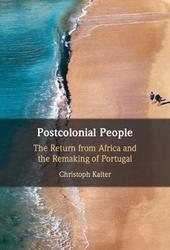
|
Postcolonial People: The Return from Africa and the Remaking of Portugal
Hardback
Main Details
| Title |
Postcolonial People: The Return from Africa and the Remaking of Portugal
|
| Authors and Contributors |
By (author) Christoph Kalter
|
| Physical Properties |
| Format:Hardback | | Pages:340 | | Dimensions(mm): Height 235,Width 157 |
|
| Category/Genre | Colonialism and imperialism |
|---|
| ISBN/Barcode |
9781108837699
|
| Classifications | Dewey:327.4690673 |
|---|
| Audience | |
|---|
| Illustrations |
Worked examples or Exercises; Worked examples or Exercises
|
|
Publishing Details |
| Publisher |
Cambridge University Press
|
| Imprint |
Cambridge University Press
|
| Publication Date |
26 May 2022 |
| Publication Country |
United Kingdom
|
Description
Having built much of their wealth, power, and identities on imperial expansion, how did the Portuguese and, by extension, Europeans deal with the end of empire? Postcolonial People explores the processes and consequences of decolonization through the histories of over half a million Portuguese settlers who 'returned' following the 1974 Carnation Revolution from Angola, Mozambique, and other parts of Portugal's crumbling empire to their country of origin and citizenship, itself undergoing significant upheaval. Looking comprehensively at the returnees' history and memory for the first time, this book contributes to debates about colonial racism and its afterlives. It studies migration, 'refugeeness,' and integration to expose an apparent paradox: The end of empire and the return migrations it triggered belong to a global history of the twentieth century and are shaped by transnational dynamics. However, they have done nothing to dethrone the primacy of the nation-state. If anything, they have reinforced it.
Author Biography
Christoph Kalter is Professor of History at the University of Agder, where he specializes in the modern history of Western Europe in its global contexts. He is the author of The Discovery of the Third World: Decolonization and the Rise of the New Left in France, c. 1950-1976 (Cambridge University Press, 2016), first published as Die Entdeckung der Dritten Welt. Dekolonisierung und neue radikale Linke in Frankreich (Campus 2011). The book was awarded the Walter-Markov-Prize (2011) and the prize Geisteswissenschaften International (2012).
Reviews'Christoph Kalter's deeply researched analysis of those who 'returned' to Portugal from Africa upon decolonization asks critical questions about race, racism, and postcolonial national belonging and interrogates persistent lusotropical colonial myths. In our era of resurgent imperial memories and controversies, Postcolonial People's lucid insights make it timely and invaluable reading.' Elizabeth Buettner, University of Amsterdam 'Decolonization not only changed the map of the world, but also had deep repercussions on European societies. Surely the definitive study of the half-million retornados coming to Portugal at empire's end in 1975, Postcolonial People makes a fascinating contribution to the history of migration, of public memory, and of postcolonial Europe.' Sebastian Conrad, Free University of Berlin 'Postcolonial People provides a pathbreaking account of Europe's last major decolonization, focusing on the retornados who migrated to the Portuguese metropole. Kalter's study mines the productive space created by gaps between protagonists' understandings of their experiences and legal categories such as refugee and citizen. In lively and accessible prose, Kalter demonstrates how transnational processes of migration from Portugal's former colonies and international humanitarian responses paradoxically worked to entrench notions of the nation, even as they transformed the very meanings and borders of that national community. Wide-ranging, meticulously researched, comparatively informed, and conceptually sharp, Postcolonial People breaks new ground in its analysis of how the simultaneous end of empire and authoritarian rule in Portugal reconfigured what it meant to be Portuguese in legal and socio-cultural terms.' Pamela Ballinger, University of Michigan 'This is an original and pathbreaking work, empirically solid and analytically sophisticated. It corrects several unsubstantiated historiographical and public claims, offering a compelling assessment of the massive immigration from the former Portuguese colonies in Africa as a consequence of the interrelated dynamics of democratization, after the Revolucao dos Cravos of 1974, and formal decolonization. Moreover, it contributes to a richer study of European trajectories of decolonization and their multifaceted and enduring effects.' Miguel Bandeira Jeronimo, University of Coimbra
|